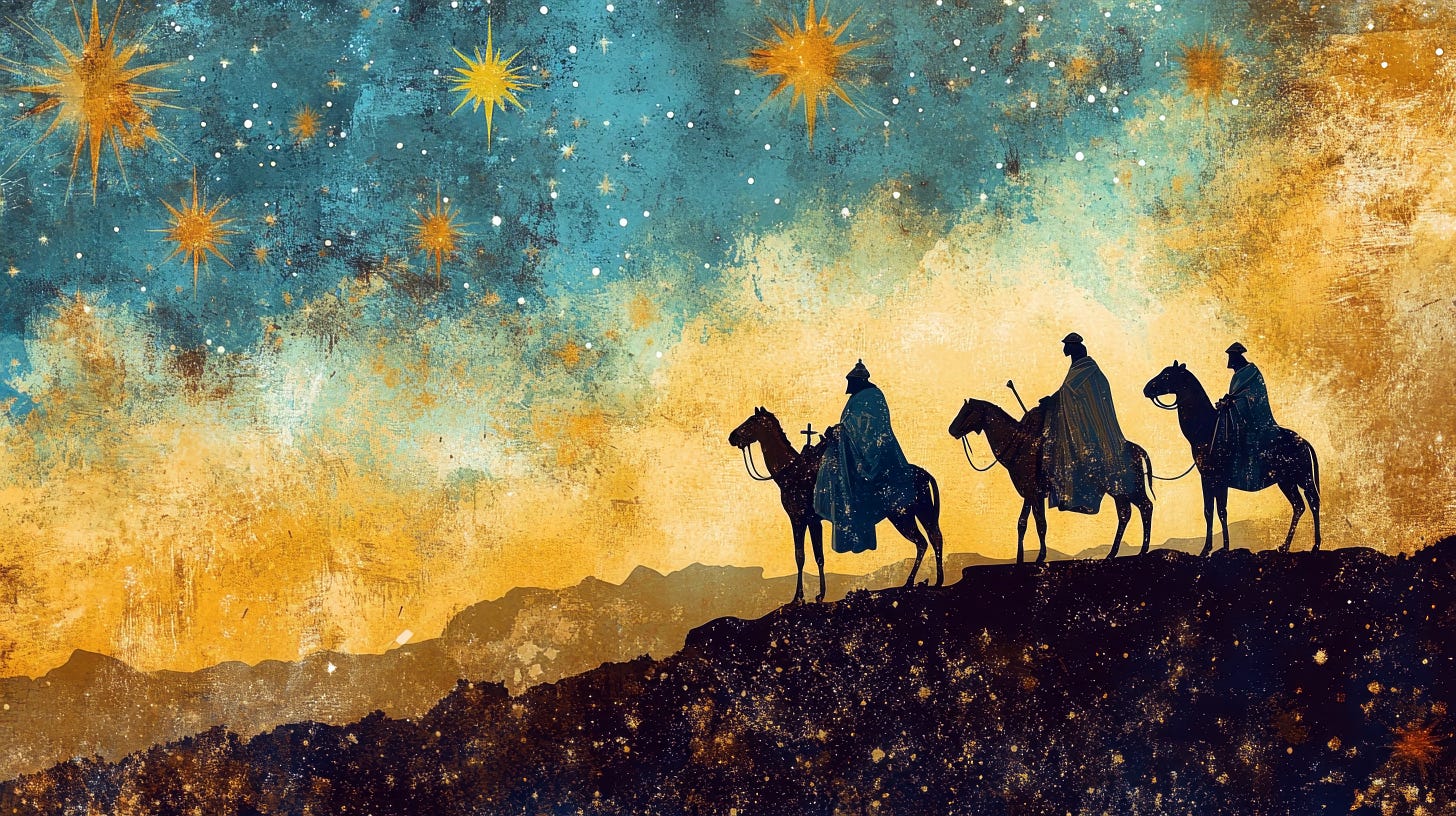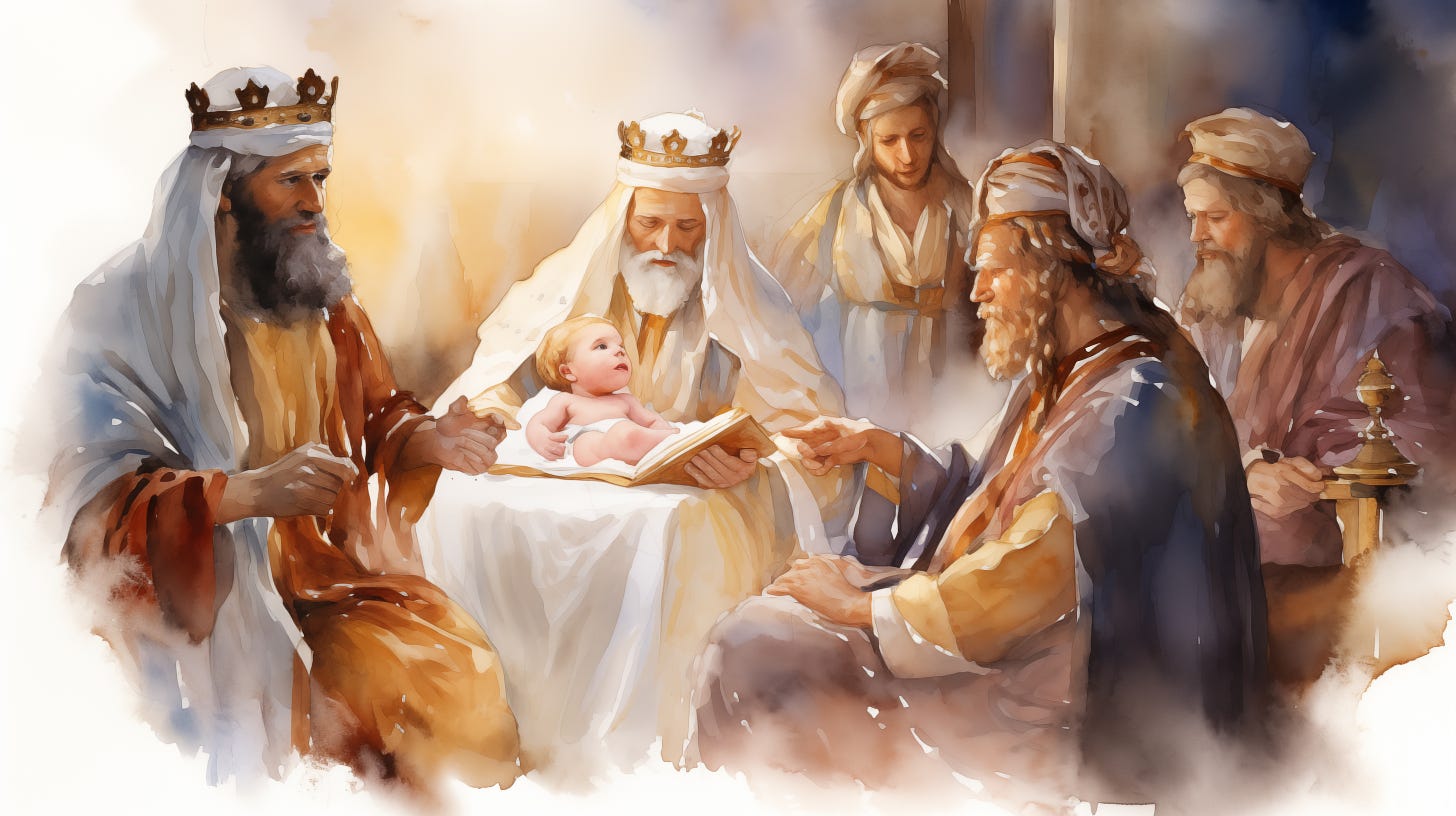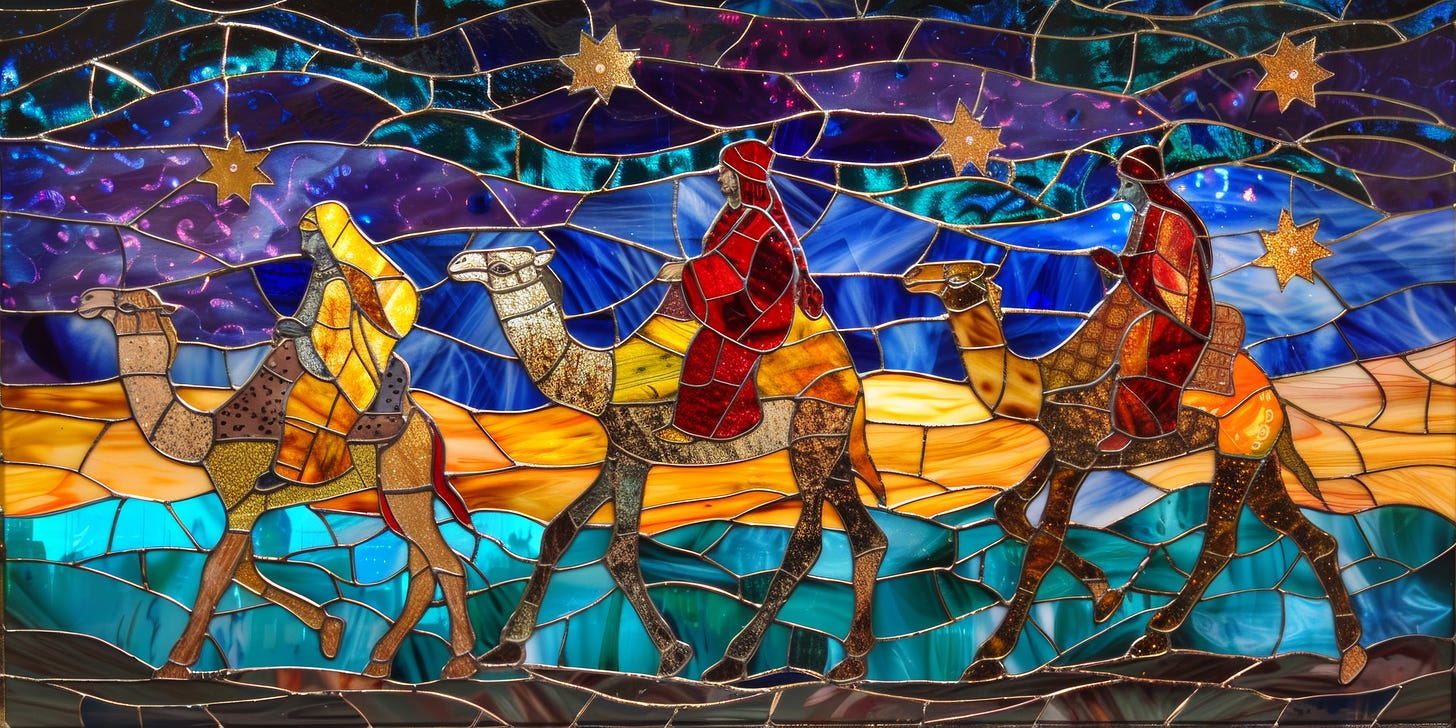A Star-Studded Quest to the King ✨

As the Christmas season unfolds, the story of the wise men, or Magi, often takes a backseat to the nativity narrative. However, their journey to honor the newborn King extends the celebration of Christ’s birth into January, particularly on Epiphany, January 6, which commemorates His revelation to the Gentiles. (Note: these are simply church traditions created to help believers celebrate the readings and truths in the Scripture. Epiphany is not mentioned in the scriptures and is not mandated as a Christian celebration.) But for many, it is helpful in a broad perspective of the divine and heavenly events surrounding Christmas. By reflecting on the Magi’s story after Christmas Day, we gain deeper insights into the significance of Jesus’ birth for all nations, emphasizing the universal call to worship Him. Their visit enriches the Christmas narrative and reminds us that the celebration of Christ’s coming continues long after the holiday season ends.
Imagine a star piercing the night sky, guiding seekers from distant lands to the humble birthplace of the King of Kings. The Wise Men, or Magi, making their way to Bethlehem is not just a captivating chapter in the New Testament; it’s a powerful reminder of how prophecy unfolds and cultures converge in the light of Christ. Found in the Gospel of Matthew (Matthew 2:1-12), this story invites us to explore the universal truth of Jesus’ sovereignty and the enduring spirit of worship that transcends boundaries. Join us as we uncover truth and meaning behind their ancient journey.
Matthew 2:1-12 | The Magi Visit the Messiah
After Jesus was born in Bethlehem in Judea, during the time of King Herod, Magi[a] from the east came to Jerusalem 2 and asked, “Where is the one who has been born king of the Jews? We saw his star when it rose and have come to worship him.”
3 When King Herod heard this he was disturbed, and all Jerusalem with him. 4 When he had called together all the people’s chief priests and teachers of the law, he asked them where the Messiah was to be born. 5 “In Bethlehem in Judea,” they replied, “for this is what the prophet has written:
6 “‘But you, Bethlehem, in the land of Judah,
are by no means least among the rulers of Judah;
for out of you will come a ruler
who will shepherd my people Israel.’[b]”
7 Then Herod called the Magi secretly and found out from them the exact time the star had appeared. 8 He sent them to Bethlehem and said, “Go and search carefully for the child. As soon as you find him, report to me, so that I too may go and worship him.”
9 After they had heard the king, they went on their way, and the star they had seen when it rose went ahead of them until it stopped over the place where the child was. 10 When they saw the star, they were overjoyed. 11 On coming to the house, they saw the child with his mother Mary, and they bowed down and worshiped him. Then they opened their treasures and presented him with gifts of gold, frankincense and myrrh. 12 And having been warned in a dream not to go back to Herod, they returned to their country by another route.
Holy Bible, New International Version®, NIV® Copyright ©1973, 1978, 1984, 2011 by Biblica, Inc.® Used by permission. All rights reserved worldwide.
Who Were the Magi?
The term “Magi” refers to a group of learned individuals, often associated with astrology, astronomy, and ancient wisdom. Historically, they were likely Persian priests or scholars from the East, possibly from regions such as Babylon or Persia, where Zoroastrianism and astrology were prominent.
The Gospel of Matthew recounts how the Magi, or wise men, arrived in Jerusalem, capturing the attention of King Herod I with their inquiry: “Where is the child who has been born king of the Jews? For we observed his star at its rising” (Matthew 2:2). This visit was significant, as it fulfilled the prophecy of Isaiah 60:3, which foretold that nations would be drawn to the light of the Messiah. Herod, having consulted the priests and scribes about the prophecy, learned that the Messiah would be born in Bethlehem, and he sought confirmation of the star’s appearance date.
The Magi proceeded to Bethlehem, where they worshiped Jesus and presented gifts of gold, frankincense, and myrrh—each symbolizing profound truths about Christ: gold for His kingship, frankincense for His divinity, and myrrh foreshadowing His suffering and death (Matthew 2:11). However, after being warned in a dream not to return to Herod, they chose a different path home (Matthew 2:12).
Pastor John Piper reflects on the significance of the Magi’s journey, stating, “The Magi came to worship the King, demonstrating that the gospel is for all nations, not just the Jews. Their journey from afar symbolizes the universal call to recognize Christ as Lord.” Tragically, Herod’s fear of losing power led to the massacre of young boys in Bethlehem, an event that the Church commemorates reminding us of the cost of Christ’s arrival into the world.
How Did the Wise Men Know?
The Wise Men were not just astronomers—they were educated scholars well-versed in ancient prophecies. These men were known for their ability to interpret celestial signs, which they believed could signify significant events.
The story of the wise men, or Magi, seeking Jesus can be intricately connected to the legacy of Daniel in the Old Testament. After Daniel was miraculously saved from the lions’ den, King Darius of Babylon declared, “I make a decree that in all my royal dominion people are to tremble and fear before the God of Daniel” (Daniel 6:26, ESV). This proclamation not only affirmed the sovereignty of Daniel’s God but also spread awareness of His power and authority throughout the kingdom.
As a result, it is plausible that the Magi, having roots in the ancient Persian Empire, would have been influenced by the accounts of Daniel’s faith and the testimony of God’s miraculous acts. Daniel, known for his wisdom and interpretation of dreams, may have inspired generations of scholars and astrologers in the East to study sacred texts and prophecies. The prophetic writings, including those about the coming Messiah, could have been preserved and revered among the Magi, leading them to recognize the significance of the star that heralded Jesus’ birth.
This connection suggests that the Magi’s journey to worship the newborn King was not merely a chance event but rather a culmination of a rich history of God revealing Himself to the nations. The prophecies regarding the Messiah, which the Magi likely encountered through their studies of Jewish texts, would have deepened their understanding and anticipation of a Savior, aligning with the broader biblical narrative that emphasizes God’s desire for all peoples to come to Him (Isaiah 60:3). Thus, the Magi’s visit can be seen as a fulfillment of this divine plan, bringing together the legacy of Daniel with the hope of redemption found in Christ.
Over centuries, this knowledge of Hebrew texts and Messianic prophecies was preserved among scholars in the East. The Magi’s studies enabled them to recognize the timing of the Messiah’s birth and the signs that would guide them to Him.
The Importance of Timing and Place
The Magi’s understanding of Scripture was pivotal in their ability to identify the time and place of Jesus’ birth. Two key prophecies stand out:
- Micah 5:2 prophesies:
“But thou, Bethlehem Ephratah, though thou be little among the thousands of Judah, yet out of thee shall he come forth unto me that is to be ruler in Israel.” - Numbers 24:17 foretells:
“I shall see him, but not now; I shall behold him, but not nigh: there shall come a Star out of Jacob, and a Sceptre shall rise out of Israel.”
These passages clearly pointed to a ruler who would arise from Bethlehem and be heralded by a star. The Magi, discerning this truth, knew the signs and acted on them.
While the Bible does not explicitly detail how they made these connections, their journey suggests a profound understanding of God’s plan. Their recognition of this Child as the “King of the Jews” demonstrates their spiritual insight, which went far beyond mere intellect.
The Journey to Bethlehem
The Magi’s journey was no small feat. Traveling a considerable distance across deserts and unfamiliar lands, they were guided by the star they believed marked the birth of a great King. This journey was not only arduous but also politically charged. Upon arriving in Jerusalem, they inquired, “Where is he who has been born king of the Jews?” (Matthew 2:2).
Their question disturbed King Herod, who was notorious for his paranoia and ruthless measures to protect his throne. Herod consulted the chief priests and scribes, who confirmed the prophecy of the Messiah’s birth in Bethlehem (Micah 5:2). Pretending to be eager to worship the Child himself, Herod instructed the Wise Men to report back to him—a deceitful request that revealed his true intentions to eliminate the perceived threat.
The Encounter and Worship
Upon reaching Bethlehem, the Magi found Jesus, Mary, and Joseph in humble surroundings—not in a palace or temple, but likely a modest home. Their response was immediate and profound: they bowed in worship and presented gifts of immense symbolic value.

- Gold: Acknowledging Jesus’ royal status as the King of Kings.
- Frankincense: A fragrant resin used in worship, symbolizing Jesus’ divinity and His role as our High Priest.
- Myrrh: A burial spice, foreshadowing His suffering and sacrificial death.
This act of worship demonstrated their recognition of Jesus’ multifaceted identity—both divine and human, King and Savior. It also set a precedent for the reverence and offerings we bring to Christ today.
Understanding the Prophecies
The journey of the Magi also reveals a profound truth: wisdom begins with reverence for God. As Proverbs 1:7 teaches, “The fear of the Lord is the beginning of knowledge.” The Magi’s wisdom was not merely intellectual; it was spiritual. Their ability to interpret the Scriptures and the celestial signs stemmed from their reverence for God’s Word and His revealed will. It is possible that Daniel’s testimony and influence laid the foundation for their understanding. Through generations, the Magi preserved a knowledge of the Hebrew Scriptures and anticipated the arrival of the Messiah. This reminds us that true wisdom comes not from worldly knowledge but from seeking and submitting to the divine.
Theological Implications
The visit of the Wise Men is a beautiful depiction of God’ plan for salvation. Their journey and worship signify that Jesus came not just for the Jews but for all people. The Magi, representing the Gentiles, were among the first to recognize and honor Jesus as King, illustrating the breaking down of barriers between nations and cultures.
Their story also challenges us to seek truth with perseverance, as they did. The Magi left their homes, endured a long and difficult journey, and followed the star with unwavering determination—all to worship the newborn King.
The story of the Magi is a rich tapestry of theological truths:
- Jesus’ Universal Kingship: The Magi’s journey highlights that Jesus came for all people, breaking cultural and ethnic boundaries. As Gentiles, the Magi’s worship affirms the inclusivity of the Gospel, echoing Paul’s declaration in Galatians 3:28: “There is neither Jew nor Gentile… for you are all one in Christ Jesus.”
- The Pursuit of Truth: The Magi’s commitment to seeking the Messiah, despite the obstacles, serves as a powerful example for believers. Their journey reminds us of the importance of seeking spiritual truth and being open to God’s revelations.
- The Contrast of Responses: The Magi’s worshipful response stands in stark contrast to Herod’s hostility. This duality reflects the broader human response to Christ—some will embrace Him, while others will reject or oppose Him.
- God’s Sovereignty: From the guiding star to the dream warning the Magi, God’s hand is evident throughout the narrative. His sovereignty ensures the fulfillment of His plans, even amid human resistance.
Lessons for Today
The journey of the Magi offers timeless lessons for modern believers:
- Seek Christ with Intention: Just as the Magi embarked on a journey of faith, we are called to seek Jesus with diligence and devotion, trusting that He will guide us.
- Offer Our Best: The Magi’s gifts remind us to bring our best to Christ—not only material offerings but also our time, talents, and hearts.
- Jesus Came for the Whole World. The Magi’s presence at the nativity foreshadows the global reach of the Gospel. As followers of Christ, we are called to welcome and celebrate the diversity of His kingdom.

The journey of the Wise Men is a story of faith, wisdom, and God’s faithfulness in fulfilling His promises. Their pursuit of the truth led them to Jesus, where they offered Him gifts that reflected His kingship, divinity, and sacrifice.
In a world filled with distractions and competing priorities, their story serves as a reminder to seek Christ with the same fervor, humility, and joy. True wisdom comes from recognizing His sovereignty, following His guidance, and offering Him our hearts in worship.
What does the journey of the Wise Men teach you about faith and perseverance? Are there “signs” in your life that God is using to guide you closer to Him? Share your thoughts and let’s reflect together on how we can follow Him more intentionally this Christmas season – share them in the comments or send me a message. Let’s journey together in seeking the One who is worthy of all our worship!







